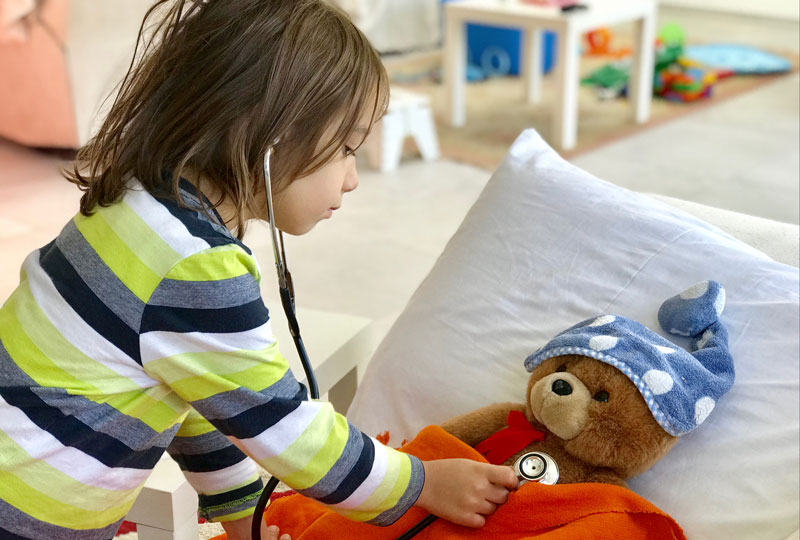Even in a hospital, children want and need to play. The importance of play is critical to their wellbeing.
Most people don’t associate a child’s hospital stay with playtime.
But play is a universal, natural behavior for children, and an essential part of healthy development. Our child life specialists are hospital employees who play with our pediatric patients, or provide them materials to play with and space to play in. Time for play during a child’s hospital stay is important, not only because it’s a natural part of the child’s everyday life, but because play can be very important in helping a child process the emotions — fear, confusion, anger and more — that can come with a procedure or hospital stay.
Some tips for encouraging play in a healthcare setting:
-
- Allow children to manipulate any medical equipment possible, even if the play does not involve using the tool “correctly.”
- Read books about other children and popular characters visiting the doctor, dentist or hospital.
- Encourage play that allows a child to express feelings. For instance, dollhouses, doctor kits, action figures, toy dinosaurs, music, painting or drawing are options for many age groups.
- Even if the adult is setting up the play, offer the child as much control over how the play happens as possible.
- Visit the playrooms and special activities provided within the hospital setting.
Play helps develop thinking, social skills, physical growth and emotional understanding. Over and over, research has shown the benefits of play that go beyond having fun in the moment.
When children play, they sharpen skills, strengthen relationships and make discoveries. They work out confusing ideas and frustrating or fearful situations. Infants and young children need play to help learn about the world around them. School-age children and, yes, adolescents, need play to provide a “safe space” to experiment with new ideas, learn give and take and build confidence.
Adults may question whether the importance of play is necessary or even appropriate for children in traumatic or stressful situations. Playfulness helps humans of all ages cope with past and present concerns, as well as prepare for future events. It is precisely during times of stress and trauma that children most often turn to play as a safe environment to release and contain feelings of fear, distress or sadness. In a healthcare setting, children and teens need play more than ever to process confusing and often uncomfortable things that are happening.
The child life specialist is a key member of your healthcare team with the unique ability to educate parents, caregivers and other healthcare professionals about the role of play. In fact, education about and advocacy for play are among the core competencies of these professionals. They recognize obstacles to play and promote a healing environment for children and families. Our child life team can explain the situations in which a child life specialist can be an especially important help to the child and the family.
This post was written by Katherine L. Bennett, MEd, CCLS, who has worked as a Certified Child Life Specialist for 19 years at Monroe Carell, Jr. Children’s Hospital at Vanderbilt. She has worked clinically with children and teens across the age span and is currently the educator for Child Life & Volunteer Services, supporting the training of clinical students and the professional development of the multi-disciplinary team regarding the developmental and psychosocial needs of children and families in health care settings.

Vanderbilt’s Children’s After-Hours Clinics offer the convenience of a walk-in clinic with care provided by a board-certified pediatrician from Children’s Hospital. No appointment is necessary, but we recommend calling your pediatrician first.

